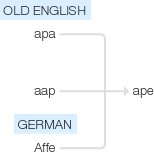Ape
Old English apa, of Germanic origin; related to Dutch aap and German Affe .
wiktionary
From Middle English ape, from Old English apa(“ape, monkey”), from Proto-West Germanic *apō, from Proto-Germanic *apô(“monkey, ape”), possibly derived from Proto-Indo-European *h₂ep-(“water”), compare Proto-Celtic *abū(“river”), if the word originally referred to a "water sprite". Traditionally assumed to be an ancient loanword instead, ultimately probably from an unidentified non-Indo-European language of regions in Africa or Asia where monkeys are native. Cognate with Scots aip(“ape”), West Frisian aap(“ape”), Dutch aap(“monkey, ape”), Low German Ape(“ape”), German Affe(“monkey, ape”), Swedish apa(“monkey, ape”), Icelandic api(“ape”).
Clipping of apeshit(“ape-shit (crazy)”).
etymonline
ape (n.)
Old English apa (fem. ape) "an ape, a monkey," from Proto-Germanic *apan (source also of Old Saxon apo, Old Norse api, Dutch aap, German affe), probably a borrowed word, perhaps from Celtic (compare Old Irish apa, Welsh epa) or Slavic (compare Old Bohemian op, Slovak opitza), and the whole group probably is ultimately from an Eastern or non-Indo-European language.
The common word until the emergence of monkey in 16c. More technically, in zoology, "a simian; tail-less, man-like monkey" 1690s. The only native apes in Europe are the Barbary apes of Gibraltar, intelligent and docile, and these were the showman's apes of the Middle Ages. Apes were noted in medieval times for mimicry of human action, hence, perhaps, the other figurative use of the word, to mean "a fool" (c. 1300).
To go ape "go crazy" is by 1953 (unsanitized or emphatic go apeshit is by 1954), American English; early attestations suggest armed forces slang. To lead apes in hell (1570s) was the fancied fate of one who died an old maid. Middle English plural was occasionally apen. Middle English also had ape-ware "deceptions, tricks."
ape (v.)
"to imitate," 1630s, but the notion is implied earlier, as in the phrase play the ape (1570s), and Middle English apeshipe "ape-like behavior, simulation" (mid-15c.); and the noun sense of "one who mimics" may date from early 13c. Related: Aped; aping.
